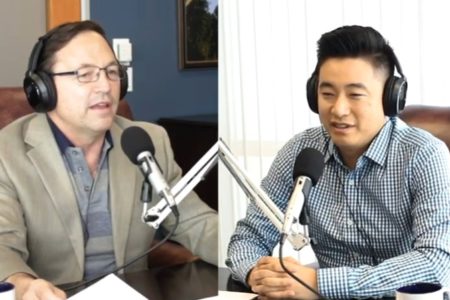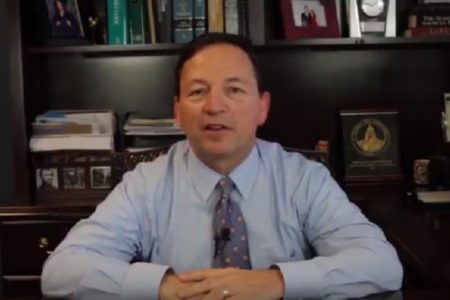
Pasadena family law attorney Donald Schweitzer and Certified Financial Planner Gail Roque, who heads Pasadena private wealth advisors Roque and Associates, talk about how individuals should go about rebuilding their financial security especially after a divorce, on the latest episode of “Exhibit A.”
Roque also provides an easy-to-follow rundown of what people, in different stages of their lives, should be doing in terms of planning for the future and securing their finances, so they live more comfortably after retirement, or maybe opt for earlier retirement.
“Exhibit A” is a podcast series that Schweitzer hosts in which he invites experts in his law firm’s core practice areas – family law, estate planning, domestic violence, and trust and probate law – to discuss these topics based on their actual experiences in dealing with their clients.
A recent episode is titled “Financial Recovery Post-Divorce.”
“We have a lot of people in my practice who never really took the helm with respect to dealing with finances,” Schweitzer says as he opens the podcast. “I see a lot of cases where one spouse or the other manages everything. Sometimes they’re very secretive about the finances and they don’t let the other side know what’s going on. Consequently, the ‘out spouse’ as we call them doesn’t pick up the habits, doesn’t have any knowledge about how to do finances, they just basically know how to spend money according to what was given them, like a credit card or some cash or anything.”
Schweitzer’s law firm deals with Roque and Associates frequently and refers clients who are in need of financial advice to them.
In the podcast, Roque says she would advise people getting a divorce in their younger years to look at a wide range of options that are available to them.
“If I’m working with a younger person, what we call an achiever, they are just beginning to start looking at savings. They probably paid off debt, student loans and so on. And they really want to look at the bigger picture. If they have children, education planning, they’re thinking about insurance needs may, may own a home. If not, they’re looking to purchase one. So I help in all those areas, but then also take it one step further and we talk about estate planning, retirement, making sure that they are doing a little bit of planning for those areas, too.”
On the other hand, a 60-year-old who gets divorced needs to look at a different strategy in their financial planning, Roque says.
“If somebody is heading into retirement, they’re very, very focused on ‘Am I there yet? Do I have to still save a little bit more? What is the strategy? What is the plan?’ With those folks, a lot of times it’s mainly taking care of what other retirement assets you have in place and what is your income looks like,” says Roque. “They’re usually in their highest earning years at this point in time. And social security: when do they want to start claiming Medicare, how soon is it going to be before they’re on Medicare. Estate planning, is that in place? What insurances do they still need, what are they going to be looking at to make changes to long-term care planning, that becomes very important as well as medical issues.”
Schweitzer then presents a scenario where a wife gets hold of a large portion of the proceeds from selling property, like a home for instance, after a divorce, and asks what the wife should do in order to not squander the money.
“The first thing I would ask them is their spending habits – how have they spent in the past, how conscious are they, how fearful are they of money,” says Roque. “Because a lot of that kind of information will help me help them make good decisions for themselves. My whole purpose is to help clients gain clarity and confirmation of what they have in place. And what is the purpose of those assets? Yes, it’s very, very important that they don’t squander it away by being impulsive and not connecting the dots as to how they’re going to get to their financial goals.”
The podcast also explains how divorcing parties should prepare for an adjustment in the standard of living that they have been used to as a couple.
“The one thing that I do see is how difficult it is when parties are accustomed to a certain standard of living,” Schweitzer says. “A couple that lives here in Pasadena, for example, and they may go on trips regularly, dine out a couple of times a week. They tend to buy nice clothing, drive nice cars, send their kids to private school. There’s a certain standard of living that people may have. And then suddenly a divorce takes place and everything’s cut in half or somebody’s shorted somehow during the divorce process.”
Roque would advise such an individual to accept the fact that a chapter in his or her life is closing, and that a new one is beginning.
“It’s the opening of a new chapter, and taking charge of their finances is a very wonderful feeling of being in control,” Roque says. “So we’ll lay out a financial plan – what are your goals? We’ll assess, ‘Do you have a budget? Do you have a cash reserve? Debt? What’s your credit situation look like?’ So all these little pieces, and then let’s start assessing the longer term goals. ‘Are you on pace for that?’ So when people have a written financial plan, one of the things I’ve learned is they make their own decisions. They can become frugal because that would mean they see the end in mind. I literally run numbers interactively with clients and they get to make decisions.”
Schweitzer and Roque then go on to discuss things like insurance plans, building a good credit score and restoring credit when damaged, and, interestingly, how people should look ahead and even early in life – like before getting married – consider looking at the possibility of their being divorced so they could plan their finances more effectively.
Episodes “Exhibit A” are posted on the website of the Schweitzer Law Partners, www.pasadenalawoffice.com, as well as on their YouTube channel, www.youtube.com/channel/UCMc_BbulrVvSVVf6Em5p3yQ.
The law firm’s address is at 201 South Lake Ave. Suite 800 in Pasadena.
For more information, call (626) 788-5225.






